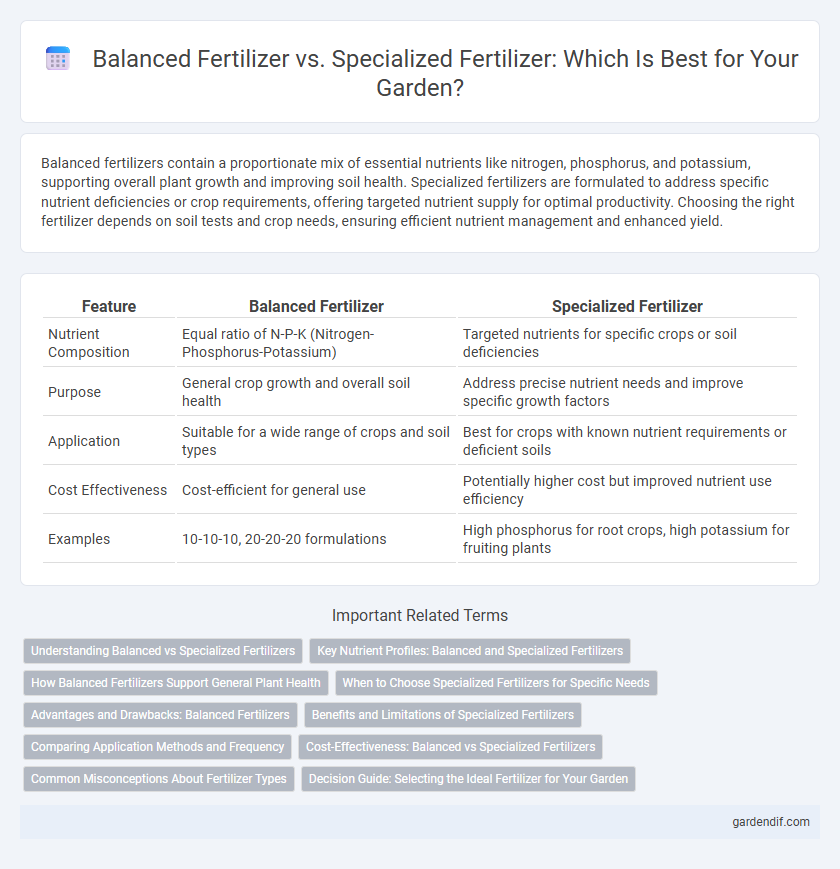
Balanced fertilizer vs specialized fertilizer Illustration
Balanced fertilizers contain a proportionate mix of essential nutrients like nitrogen, phosphorus, and potassium, supporting overall plant growth and improving soil health. Specialized fertilizers are formulated to address specific nutrient deficiencies or crop requirements, offering targeted nutrient supply for optimal productivity. Choosing the right fertilizer depends on soil tests and crop needs, ensuring efficient nutrient management and enhanced yield.
Table of Comparison
| Feature | Balanced Fertilizer | Specialized Fertilizer |
|---|---|---|
| Nutrient Composition | Equal ratio of N-P-K (Nitrogen-Phosphorus-Potassium) | Targeted nutrients for specific crops or soil deficiencies |
| Purpose | General crop growth and overall soil health | Address precise nutrient needs and improve specific growth factors |
| Application | Suitable for a wide range of crops and soil types | Best for crops with known nutrient requirements or deficient soils |
| Cost Effectiveness | Cost-efficient for general use | Potentially higher cost but improved nutrient use efficiency |
| Examples | 10-10-10, 20-20-20 formulations | High phosphorus for root crops, high potassium for fruiting plants |
Understanding Balanced vs Specialized Fertilizers
Balanced fertilizers contain essential nutrients in equal or nearly equal proportions, providing a comprehensive nutrient supply that supports overall plant growth and soil health. Specialized fertilizers, on the other hand, are formulated with specific nutrient ratios tailored to particular crops, growth stages, or soil deficiencies, optimizing nutrient efficiency and yield. Selecting the appropriate fertilizer type depends on crop requirements, soil nutrient status, and targeted agronomic outcomes.
Key Nutrient Profiles: Balanced and Specialized Fertilizers
Balanced fertilizers contain essential nutrients like nitrogen, phosphorus, and potassium in equal or near-equal proportions, supporting overall plant growth and development. Specialized fertilizers are formulated with higher concentrations of specific nutrients tailored to address particular crop deficiencies or growth stages, such as high nitrogen for leafy vegetables or elevated potassium for fruiting plants. Understanding the key nutrient profiles helps farmers optimize soil fertility management and enhance crop yield and quality.
How Balanced Fertilizers Support General Plant Health
Balanced fertilizers contain equal proportions of nitrogen, phosphorus, and potassium, providing comprehensive nutrient support essential for overall plant growth and development. These fertilizers enhance root strength, improve leaf formation, and support flowering and fruiting by addressing multiple nutrient requirements simultaneously. Unlike specialized fertilizers that target specific deficiencies, balanced fertilizers promote consistent plant health in various soil conditions and crop types.
When to Choose Specialized Fertilizers for Specific Needs
Specialized fertilizers are ideal when crops require precise nutrient formulations to address specific soil deficiencies or achieve targeted growth outcomes. These fertilizers cater to unique crop demands such as micronutrient enrichment or particular growth stages, ensuring optimal nutrient availability. Opting for specialized fertilizers enhances nutrient use efficiency and crop yield in conditions where balanced fertilizers may not fully meet crop nutritional requirements.
Advantages and Drawbacks: Balanced Fertilizers
Balanced fertilizers provide a uniform mix of essential nutrients such as nitrogen, phosphorus, and potassium, supporting overall plant health and growth across various crops. Their advantage lies in versatility and ease of application, reducing the risk of nutrient imbalances, while drawbacks include less optimization for specific soil deficiencies or crop needs compared to specialized fertilizers. Farmers benefit from balanced fertilizers in general farming scenarios, but may experience lower efficiency or crop yields in cases requiring targeted nutrient management.
Benefits and Limitations of Specialized Fertilizers
Specialized fertilizers offer targeted nutrient formulations that address specific crop needs, enhancing nutrient uptake efficiency and improving yield quality. These fertilizers minimize nutrient wastage and environmental impact but may require precise application techniques and can be costlier compared to balanced fertilizers. Limited nutrient range in specialized fertilizers may necessitate supplementary use to meet all crop nutritional demands.
Comparing Application Methods and Frequency
Balanced fertilizers, containing a proportional mix of nitrogen, phosphorus, and potassium, are typically applied uniformly across fields to support general crop growth, often requiring fewer applications due to their comprehensive nutrient profile. Specialized fertilizers target specific nutrient deficiencies or crop stages, necessitating more precise application methods such as foliar sprays or side-dressing and often increased frequency to address particular plant needs effectively. Application frequency for specialized fertilizers depends on crop type and growth cycle, while balanced fertilizers are usually applied less frequently but in larger quantities to maintain overall soil fertility.
Cost-Effectiveness: Balanced vs Specialized Fertilizers
Balanced fertilizers provide a cost-effective solution by supplying multiple essential nutrients in a single application, reducing the need for additional inputs and labor. Specialized fertilizers target specific nutrient deficiencies, often resulting in higher upfront costs but enhanced crop performance in nutrient-specific scenarios. Evaluating soil nutrient status and crop requirements is crucial to optimizing the economic benefits of either balanced or specialized fertilization strategies.
Common Misconceptions About Fertilizer Types
Balanced fertilizers provide equal proportions of nitrogen, phosphorus, and potassium, which supports overall plant growth, but a common misconception is that they are always the best choice for all crops or soil types. Specialized fertilizers are formulated to address specific nutrient deficiencies or crop requirements, yet many believe they are too costly or unnecessary when a standard balanced fertilizer might suffice. Understanding soil tests and crop needs is crucial to selecting the appropriate fertilizer type, avoiding the mistaken assumption that one solution fits every agricultural scenario.
Decision Guide: Selecting the Ideal Fertilizer for Your Garden
Balanced fertilizers contain equal proportions of nitrogen, phosphorus, and potassium, making them ideal for general gardening needs by promoting overall plant health and growth. Specialized fertilizers target specific nutrient deficiencies or plant types, such as high-phosphorus blends for flowering plants or high-nitrogen formulations for leafy vegetables, optimizing results based on garden requirements. Evaluating soil tests and plant growth stages helps determine whether a balanced or specialized fertilizer maximizes nutrient uptake and garden productivity.
Balanced fertilizer vs specialized fertilizer Infographic

 gardendif.com
gardendif.com